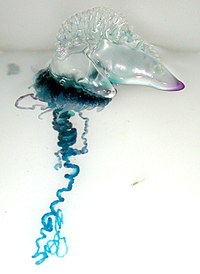
Photo from wikipedia
To comprehensively evaluate the etiological role of ABO blood group in human cancer, we conducted a large‐scale meta‐analysis of 127 publications totaling 20 million participants including 231 737 patients of 20… Click to show full abstract
To comprehensively evaluate the etiological role of ABO blood group in human cancer, we conducted a large‐scale meta‐analysis of 127 publications totaling 20 million participants including 231 737 patients of 20 cancers, supplemented by genetic evidence. Effects of A, AB and B groups on cancer risk were investigated by respectively comparing with O group and their combined counterparts, and subgroup analysis by ethnicity was conducted for O‐referent models. For cancer categories, A group increased risk of cancers of oral cavity and nasopharynx, digestive and female genital organs, while both AB and B groups showed associations with cancers of digestive and female genital organs. For individual cancers, A group significantly increased the risk of nine cancers including oral cavity (OR = 1.17, P = .013), stomach (OR = 1.19, P = 3.90 × 10−15), pancreas (OR = 1.33, P = 9.89 × 10−33), colorectum (OR = 1.09, P = .001), liver (OR = 1.23, P = .011), ovary (OR = 1.13, P = .001), cervix (OR = 1.17, P = .025), bladder (OR = 1.12, P = .025) and breast (OR = 1.06, P = .043). AB group showed associations with only three cancers: stomach (OR = 1.10, P = .007), pancreas (OR = 1.21, P = .001) and ovary (OR = 1.28, P = .006). B group, except for shared associations with A group on pancreas (OR = 1.20, P = 2.27 × 10−5) and cervix cancers (OR = 1.13, P = .011), had two distinct associations with esophagus (OR = 1.17, P = .002) and nonmelanoma skin cancers (OR = 0.96, P = .017). Ethnicity‐specific analyses revealed the notable effects of non‐O groups on pancreatic cancer both in Caucasians and Asians. In genetic analysis, four SNPs were associated with the risk of pancreatic cancer, with rs505922 corresponding to O group showing the strongest protective effect (P = 1.16 × 10−23). Our study provided comprehensive evidence of ABO blood group associated with cancers and highlighted its carcinogenic role.
Journal Title: International Journal of Cancer
Year Published: 2023
Link to full text (if available)
Share on Social Media: Sign Up to like & get
recommendations!